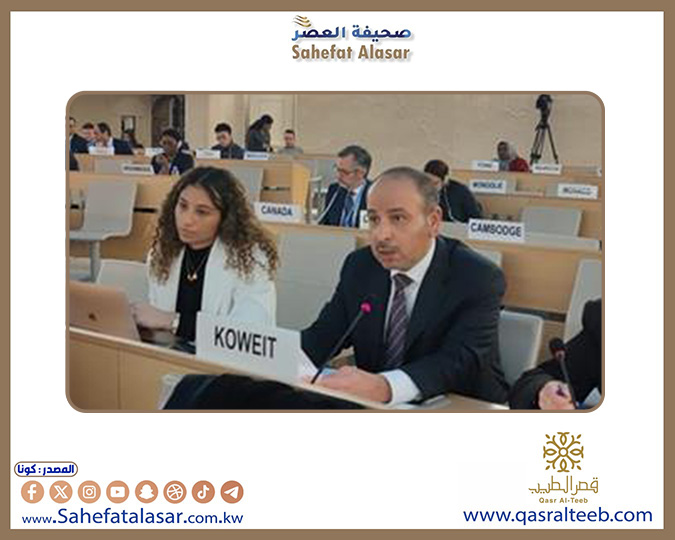


The Permanent Representative of the State of Kuwait to the United Nations and other international organizations in Geneva, Ambassador Nasser Al-Hain, affirmed today, Monday, the unwavering commitment of the Gulf Cooperation Council (GCC) to empowering women and girls with disabilities and promoting their rights in society.
This came in a statement delivered by Ambassador Al-Hain in his capacity as the Chairman of the Council of Ambassadors of the Gulf Cooperation Council states during the interactive dialogue session with the UN Special Rapporteur on the Rights of Persons with Disabilities, as part of the 58th session of the United Nations Human Rights Council in Geneva.
He called for intensifying international efforts to address the gaps that hinder the achievement of full equality for women and girls with disabilities, explaining that "the dual factors of discrimination and the obstacles faced by women and girls with disabilities prevent full equality and place them among the most vulnerable and marginalized groups, despite the progress made at the international level."
In this context, he emphasized the priority that the rights of persons with disabilities hold for the GCC states, pointing to the ongoing efforts of the Council’s member states to develop legislative, technical, and financial means to ensure the full enjoyment of the rights of persons with disabilities. He highlighted how economic, technological, and health advancements are being harnessed to better support their social and economic inclusion.
He noted that all GCC states have ratified the Convention on the Rights of Persons with Disabilities and have established national legislation and programs to promote their inclusion, with a particular focus on women and girls. This is achieved by removing all systemic barriers that hinder their access to education, employment, healthcare, and social services.
Ambassador Al-Hain affirmed the "holistic approach" adopted by the GCC states to enhance the participation of women and girls with disabilities in public life, enabling them to assume leadership roles and participate more broadly in decision-making processes.
During the dialogue session, he reviewed various pioneering initiatives and experiences undertaken by the GCC states to empower women and girls with disabilities. These include leadership training programs, capacity-building initiatives, and the allocation of financial resources, as well as the launch of national and regional platforms and competitions that ensure their voices are heard and their presence is strengthened across various fields.
He explained that these initiatives have contributed to "Gulf women and girls with disabilities assuming prominent positions in recent years, enabling them to actively contribute to cultural, political, and scientific fields at both national and international levels."
Ambassador Al-Hain highlighted the adoption by the GCC of the (Unified Law for the Protection of Persons with Disabilities) in 2019, which aims to enhance the rights-based achievements of this group and ensure their rights in all member states. This ensures the removal of obstacles, their empowerment, and the enhancement of their contribution to community development.
He reaffirmed the commitment of the GCC states to continue their efforts in supporting and empowering women and girls with disabilities, and to cooperate with the international community to promote their rights and achieve comprehensive development for them.